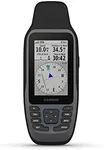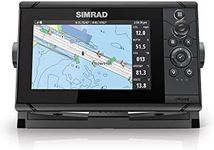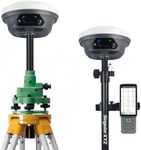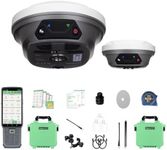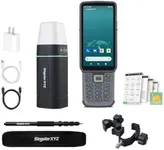Buying Guide for the Best Handheld Marine Gps
Choosing the right handheld marine GPS can significantly enhance your boating experience by providing accurate navigation, safety, and convenience. When selecting a handheld marine GPS, it's important to consider several key specifications to ensure it meets your needs. Understanding these specifications will help you make an informed decision and find the best fit for your marine adventures.Display Size and ResolutionThe display size and resolution of a handheld marine GPS are crucial for readability and ease of use. A larger display with higher resolution will provide clearer and more detailed maps, which is especially important in bright sunlight or rough conditions. Displays typically range from 2 to 5 inches. If you need to see more details and have the space to store a larger device, opt for a bigger screen. However, if portability is a priority, a smaller screen might be more suitable.
Waterproof RatingThe waterproof rating indicates how well the device can withstand water exposure. This is particularly important for marine environments where the device is likely to get wet. Look for a GPS with at least an IPX7 rating, which means it can be submerged in water up to 1 meter for 30 minutes. If you expect to use the device in harsher conditions, consider a higher rating like IPX8 for better protection.
Battery LifeBattery life determines how long the GPS can operate before needing a recharge or battery replacement. Longer battery life is essential for extended trips or when you don't have easy access to power sources. Handheld marine GPS devices typically offer battery life ranging from 10 to 30 hours. Choose a device with longer battery life if you plan on long voyages or multi-day trips. For shorter outings, a device with moderate battery life may suffice.
Satellite ReceptionSatellite reception affects the accuracy and reliability of the GPS. Devices that support multiple satellite systems (such as GPS, GLONASS, and Galileo) provide better coverage and faster position fixes. This is particularly useful in challenging environments like dense forests or deep canyons. If you need precise navigation and quick updates, opt for a device with multi-satellite support. For casual use in open waters, a standard GPS system may be adequate.
Mapping and Charting CapabilitiesMapping and charting capabilities determine the level of detail and types of maps available on the device. Some GPS units come with preloaded marine charts, while others allow you to download additional maps. High-detail charts are essential for navigating complex waterways and avoiding hazards. If you frequently explore new areas or need detailed navigation aids, choose a device with comprehensive mapping options. For basic navigation, simpler maps may be sufficient.
Durability and Build QualityDurability and build quality are important for ensuring the device can withstand the harsh marine environment. Look for a rugged design with shock resistance and sturdy materials. A well-built GPS will last longer and perform better under tough conditions. If you plan to use the device in rough seas or during intense activities, prioritize durability. For more casual use, standard build quality may be acceptable.
User Interface and Ease of UseThe user interface and ease of use affect how quickly and efficiently you can operate the GPS. A simple, intuitive interface with easy-to-navigate menus and controls is important, especially in stressful situations. Touchscreen interfaces can be convenient, but make sure they are responsive and usable with wet hands or gloves. If you prefer straightforward operation, look for a device with a user-friendly interface. For more advanced features, be prepared for a steeper learning curve.
Additional FeaturesAdditional features such as waypoint marking, route planning, and integration with other marine electronics can enhance the functionality of your GPS. Some devices offer features like weather updates, tide information, and fish-finding capabilities. Consider what extra features are important for your specific needs. If you require comprehensive navigation tools and additional data, choose a device with these capabilities. For basic navigation, fewer features may be sufficient.




